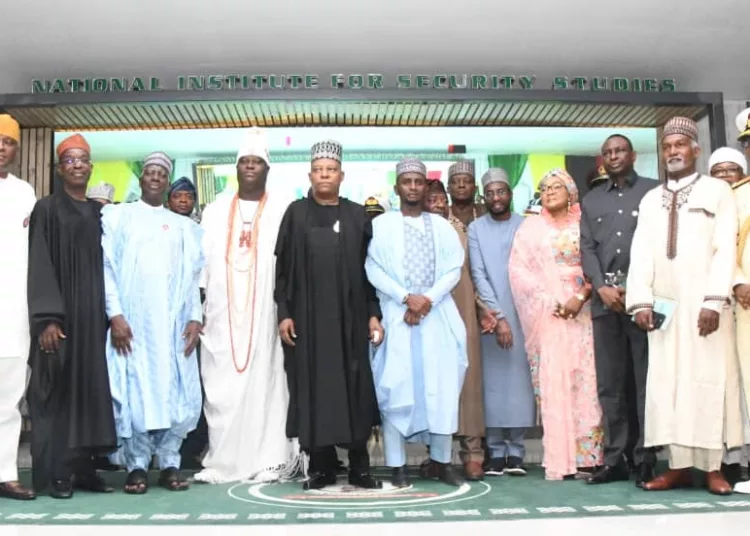The Vice President, Kashim Shettima, has drawn attention to the need for Nigeria and other African countries to form global alliances to tame crises caused by external aggressions and domestic threats.
Specifically, he noted that Nigeria and other countries are saddled with the responsibility of protecting their citizens from transnational crimes, including terrorism, climate change and cyber crime, among other global crises.
According to a statement by his spokesman, Stanley Nkwocha, the Vice President, who spoke on Saturday during the graduation ceremony of the Executive Intelligence Management Course 16, 2023 of the National Institute for Security Studies (NISS) in Abuja, told the graduands that they are the great minds armed with the required knowledge to combat these external aggressions and domestic threats in a bid to maintain regional stability on the continent.
Delivering his speech titled, “From Crisis to Stability: Our Shared Global Responsibility,” Sen. Shettima listed cutting-edge knowledge, transformative skills and innovative ideas such as the one acquired by graduands from NISS as necessary for Nigeria and its neighbours to protect their nations from threats within their borders and beyond.
He stated: “Every part of the world today has been working around the clock to form alliances to stop external aggressions and forge solutions to domestic threats. This practical approach is crucial to tame crises and drive stability.
“However, none of these aspirations can be realised without the stewardship of trained minds at the helm of institutions tasked with the solemn duty of making decisions to safeguard lives, defend properties, and preserve peace. This is why we are here.
“You are here because you have chosen to be the custodians of this responsibility, the torchbearers of knowledge and expertise essential for steering the course towards a safer world. Your presence here today is, without a doubt, a celebration—a celebration of the integration of strategic ideas and decisive action, the cornerstone upon which a secure and harmonious world stands poised to thrive.”
Noting that past happenings in Nigeria confirm that the country is as vulnerable as the world around it, VP Shettima said, “Anything that disrupts wheat production in Asia, crude oil production in the Middle East or commodity market in Africa brings consequences for the entire world.
“I have learned that this cohort, the sixteenth of the flagship program in this institution, has studied the consequences of our existence in a globalised economy on our sustainable development, and I am impressed by your ambition.
“We have found ourselves not only at the crossroads of an era where the world has become a global village, connected through an invisible web of technological advancements, economic interdependence, and social exchange but also challenged to prepare for the disruptions that come with it.”
The VP reminded the graduands that the task before them is to join in the bid to address the situation, saying, “We are tasked with the responsibility of protecting our people as transnational crime, terrorism, climate change, and pandemics loom large as formidable adversaries.
“We don’t need a balance of threat theorists to remind us that these geopolitical tensions demand a collective, cohesive response. We have proven again and again that we can never be an annex of any invidious group or be held ransom by any evil ideology. We have averted descent into a war economy because of this conviction, and believe that modern warfare isn’t waged on the field alone.”
Stating that they were not only coming to help Africa manage the crises, he said the graduands also have the task of ensuring no African country is short-changed in building regional economic integration amid the crisis, as well as bearing the mantle of fostering regional stability.
Expressing delight with the idea that the graduands are not only Nigerians, as some of them are from neighbouring countries, Sen. Shettima said, “Your role, esteemed graduates of the National Institute for Security Studies, extends far beyond the boundaries of our nation.
“You are the guardians of regional stability, the ambassadors of peace, and the architects of sustainable development across and beyond the continent. Your commitment to excellence, coupled with your unwavering determination, makes you the pillars upon which the future of our region stands.”
Earlier, Commandant of NISS, Ayodele Adeleke, explained that the Executive Management Course is aimed at producing committed managers of security, describing the graduation ceremony as a milestone in the professional development of the graduands.
He said 89 participants started the course, with six of them from African countries, but died before the end of the 10 month course, even as he later conferred the prestigious title of Fellow of the Security Institute (FSI) on all the graduands.
On his part, the Director General of Department of State Services (DSS), Yusuf Bichi, commended the Commandant and management of the Institute for taking the citadel of learning to greater heights.
He availed himself of the opportunity provided by the ceremony to admonish the people of Plateau State to eschew violence and embrace peace to give room for development.
Bichi, who pledged more support for the National Institute for Security Studies, expressed his commitment to improving the welfare of personnel of the Department of State Services.
Other dignitaries at the graduation ceremony were Senate President, Godswill Akpabio, represented by Chairman Senate Committee on National Security and Intelligence, Sen Shehu Umar; Minister of Foreign Affairs, Yusuf Tuggar, Minister of State Police Affairs, Imaan Suleiman Ibrahim; representatives of Jigawa and Yobe State Governors, and business mogul, Mr Femi Otedola, represented by Col Olusegun Oladuntoye (rtd).
Others are Group Chief Executive Officer NNPC, Mele Kyari; representatives of IGP, Chief of Air Staff; EFCC Chairman, Mr Ola Olukoyede; former Governor of Bauchi State, Barr Mohammed Abibakar, Ooni of Ife, HRM Oba Adeyeye Enitan Ojaja II; Dein of Agbor, Dein Keagborekuzi, and Chief Kola Karim.






